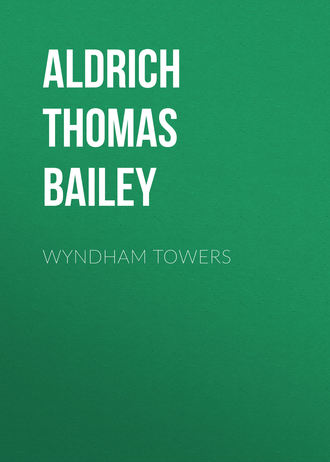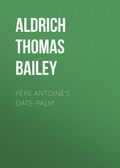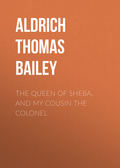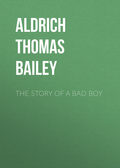полная версия

Aldrich Thomas Bailey
Wyndham Towers
So still the soul of silence seemed to grieve
The loss of that sweet laughter. In his tracks
The man stopped short, and listened. As he leaned
And craned his neck, and peered into the gloom,
And would the fabulous hundred eyes were his
That Argus in the Grecian legend had,
He saw two figures moving through a drift
Of moonlight that lay stretched across the lawn:
A man’s tall shape, a slim shape close at side,
Her palm in tender fashion pressed to his,
The woven snood about her shoulders fallen,
And from the sombre midnight of her hair
An ardent face out-looking like a star—
As in a vision saw he this, for straight
They vanished. Where those silvery shadows were
Was nothing. Had he dreamed it? Had he gone
Mad with much thinking on her, and so made
Ghosts of his own sick fancies? Like a man
Carved out of alabaster and set up
Within a woodland, he stood rooted there,
Glimmering wanly under pendent boughs.
Spell-bound he stood, in very woeful plight,
Bewildered; and then presently with shock
Of rapid pulses hammering at heart,
As mad besiegers hammer at a gate,
To life came back, and turned on heel to fly
From that accursed spot and all that was,
When once more the girl’s laugh made rich the night,
And melted, and the silence grieved anew.
Like lead his feet were, and he needs must halt.
Close upon this, but further off, a voice
From somewhere—Echo at her trick again!—
Took up the rhyme of Sweetheart, sigh no more.
It was with doubt and trembling
I whispered in her ear.
Go, take her answer, bird-on-bough,
That all the world may hear—
Sweetheart, sigh no more!
Sing it, sing it, tawny throat,
Upon the wayside tree,
How fair she is, how true she is,
How dear she is to me—
Sweetheart sigh no more!
Sing it, sing it, tawny throat,
And through the summer long
The winds among the clover-tops,
And brooks, for all their silvery stops,
Shall envy you the song—
Sweetheart, sigh no more.
‘T is said the Malays have an arrow steeped
In some strange drug whose subtile properties
Are such that if the point but prick the skin
Death stays there. Like to that fell cruel shaft
This slender rhyme was. Through the purple dark
Straight home it sped, and into Wyndham’s veins
Its drop of sudden poison did distill.
Now no sound was, save when a dry twig snapped
And rustled softly down from branch to branch,
Or on its pebbly shoals the meagre brook
Made intermittent murmur. “So, ‘t is he!”
Thus Wyndham breathing thickly, with his eyes
Dilating in the darkness, “Darrell—he!
I set my springe for other game than this;
Of hare or rabbit dreamed I, not of wolf.
His frequent visitations have of late
Perplexed me; now the riddle reads itself.
A proper man, a very proper man!
A fellow that burns Trinidado leaf
And sends smoke through his nostril like a flue!
A fop, a hanger-on of willing skirts—
A murrain on him! Would Elizabeth
In some mad freak had clapped him in the Tower—
Ay, through the Traitor’s Gate. Would he were dead.
Within the year what worthy men have died,
Persons of substance, civic ornaments,
And here ‘s this gilt court-butterfly on wing!
O thou most potent lightning in the cloud,
Prick me this fellow from the face of earth!
I would the Moors had got him in Algiers
What time he harried them on land and sea,
And done their will with scimitar or cord
Or flame of fagot, and so made an end;
Or that some shot from petronel or bow
Had winged him in the folly of his flight.
Well had it been if the Inquisitors,
With rack and screw, had laid black claw on him!”
In days whose chronicle is writ in blood
The richest ever flowed in English veins
Some foul mischance in this sort might have been;
For at dark Fortune’s feet had Darrell flung
In his youth’s flower a daring gauntlet down.
A beardless stripling, at that solemn hour
When, breaking its frail filaments of clay,
The mother’s spirit soared invisible,
The younger son, unhoused as well he knew,
Had taken horse by night to London town,
With right sore heart and nought else in his scrip
But boyish hope to footing find at Court—
A page’s place, belike, with some great lord,
Or some small lord, that other proving shy
Of merit that had not yet clipt its shell.
Day after day, in weather foul or fair,
With lackeys, hucksters, and the commoner sort,
At Whitehall and Westminster he stood guard,
Reading men’s faces with most anxious eye.
There the lords swarmed, some waspish and some bland,
But none would pause at plucking of the sleeve
To hearken to him, and the lad had died
On London stones for lack of crust to gnaw
But that he caught the age’s malady,
The something magical that was in air,
And made men poets, heroes, demi-gods—
Made Shakespeare, Rawleigh, Grenvile, Oxenham,
And set them stars in the fore-front of Time.
In fine, young Darrell drew of that same air
A valiant breath, and shipped with Francis Drake,
Of Tavistock, to sail the Spanish seas
And teach the heathen manners, with God’s aid;
And so, among lean Papists and black Moors,
He, with the din of battle in his ears,
Struck fortune. Who would tamely bide at home
At beck and call of some proud swollen lord
Not worth his biscuit, or at Beauty’s feet
Sit making sonnets, when was work to do
Out yonder, sinking Philip’s caravels
At sea, and then by way of episode
Setting quick torch1 to pirate-nests ashore?
Brave sport to singe the beard o’ the King of Spain!
Brave sport, but in the end dreamed he of home—
Of where the trout-brook lisped among the reeds,
Of great chalk cliffs and leagues of yellow gorse,
Of peaceful lanes, of London’s roaring streets,
The crowds, the shops, the pageants in Cheapside,
And heard the trumpets blaring for the Queen
When ‘t was the wind that whistled in the shrouds
Off Cadiz. Ah, and softer dreams he had
Of an unnamed and sweetest mystery,
And from the marble of his soul’s desire
Hewed out the white ideal of his love—
A new Pygmalion! All things drew him home,
This mainly. Foot on English earth once more,
Dear earth of England his propitious fame
A thorn in none but crooked Envy’s side,
He went cross-gartered, with a silken rose
At golden lovelock, diamond brooch at hat
Looping one side up very gallantly,
And changed his doublet’s color twice a day.
Ill fare had given his softer senses edge;
Good fortune, later, bade him come to dine,
Mild Spenser’s scholar, Philip Sidney’s friend.
So took he now his ease; in Devonshire,
When Town was dull, or he had need at heart
For sight of Wyndham Towers against the sky;
But chiefly did he bask him by the Thames,
For there ‘t was that Young England froze and thawed
By turns in GLORIANA’S frown and smile.
As some wild animal that gets a wound,
And prescience hath of death, will drag itself
Back to its cavern sullenly to die,
And would not have heaven’s airs for witnesses,
So Wyndham, shrinking from the very stars
And tell-tale places where the moonlight fell,
Crept through the huddled shadows back to hall,
And in a lonely room where no light was,
Save what the moon made at the casement there,
Sat pondering his hurt, and in the dark
Gave audience to a host of grievances.
For never comes reflection, gay or grave,
But it brings with it comrades of its hue.
So did he fall to thinking how his day
Declined, and how his narrow life had run
Obscurely through an age of great events
Such as men never saw, nor will again
Until the globe be riven by God’s fire.
Others had ventured for the Golden Fleece,
Knaves of no parts at all, and got renown,
(By force of circumstance and not desert,)
While he up there on that rock-bastioned coast
Had rotted like some old hulk’s skeleton,
Whose naked and bleached ribs the lazy tide
Laps day by day, and no man thinks of more.
Then was jade Fortune in her lavish mood.
Why had he not for distant Colchis sailed
And been the Jason of these Argonauts?
True, some had come to block on Tower Hill,
Or quittance made in a less noble sort;
Still they had lived, from life’s high-mantling cup
Had blown the bead. In such case, if one’s head
Be of its momentary laurel stripped
And made a show of stuck on Temple Bar
Or at the Southwark end of London Bridge,
What mattered it? At worst man dies but once—
So far as known. One may not master death,
But life should be one’s lackey. He had been
Time’s dupe and bondsman; ever since his birth
Had walked this planet with his eye oblique,
Grasped what was worthless, what were most dear missed;
Missed love and fame, and all the sum of things
Fame gets a man in England—the Queen’s smile,
Which means, when she ‘s in humor, abbey-lands,
Appointments, stars and ribbons for the breast,
And that sleek adulation that takes shape
I’ the down-drooping of obsequious lids
When one ascends a stair or walks the pave.
Good Lord! but it was excellent to see
How Expectation in the ante-room
Crooks back to Greatness passing to the Queen—
“Kind sir!” “Sweet sir!” “I prithee speed my suit!”
‘T was somewhat to be flattered, though by fools,
For even a fool’s coin hath a kind of ring.
Yet after all—thus did the grapes turn sour
To master Fox, in fable—who would care
To moil and toil to gain a little fame,
And have each rascal that prowls under heaven
Stab one for getting it? Had he wished power,
The thing was in the market-place for sale
1. Sir Francis Drake called this “singeing the King of Spayne’s beard.”







